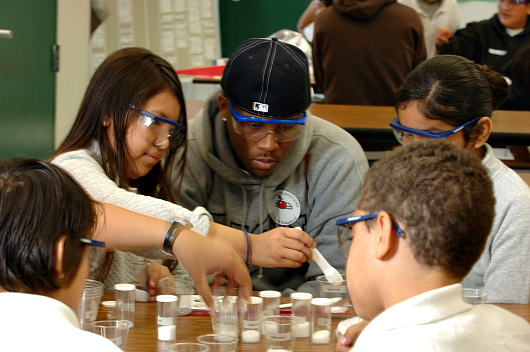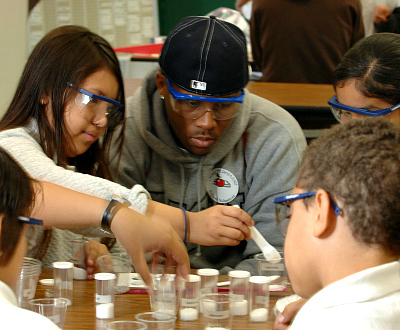
These programs match SJSU students with community-based efforts to nurture interest in science and math from a very young age (CommUniverCity photo).
San Jose State has received $25,000 grants from Intel for each of three innovative programs all aimed at getting elementary and middle school students fired up about science, technology, engineering and mathematics.
Intel is the first major donor to the Girls STEM Network and Youth STEM Network programs, under the direction of Virginia Lehmkuhl-Dakhwe of the Jay Pinson STEM Education initiative within the College of Science.
Both programs match SJSU students from the Communication Studies 157 service learning course with community-based efforts to nurture interest in science and math from a very young age.
Intel’s support will also help sustain SJSU’s Science and Engineering in Action program, which matches SJSU student mentors with underserved downtown elementary and middle schools, where they meet to explore science and engineering through engaging hands-on projects.
SJSU collaborates with CommUniverCity San Jose and YWCA Silicon Valley on these projects, in addition to many schools, serving hundreds of young people. Here’s more on all three initiatives.
Science and Engineering in Action
Science and Engineering in Action brings hands-on chemistry, earth science and engineering demonstrations to elementary and middle school students, guided by San Jose State University students. The workshops are designed to engage the K-8 students in science and engineering, strengthen their STEM knowledge, and build a relationship with college students to strengthen their confidence in striving towards college.
Each hour-long experiment gives curious elementary and middle school students a chance to explore science and engineering, subjects lacking in their typical classroom experience. Science and Engineering in Action is offered at after-school programs serving five public schools: Anne Darling Elementary, Olinder Elementary, McKinley Elementary, Horace Mann Elementary and Burnett Academy. Each semester, an average 460 SJSU students participate in Science and Engineering in Action and reach over 700 elementary and middle school students.

STEM network programs provide enrichment programs beyond what the elementary and middle school students get in school, with the goal of spurring interest in STEM fields and higher education (CommUniverCity photo).
Youth STEM Network
Youth STEM Network (YSN) is a partnership designed to build capacity for San Jose’s youth (9-14 years old) to engage in a rigorous, out-of-school science, technology, engineering, and mathematics (STEM) academic enrichment program. The partnership is a collaborative effort of San Jose State University’s Jay Pinson STEM Education program, CommUniverCity San Jose, the Center for Community Learning and Leadership and the Department of Communication Studies.
This interactive academic enrichment program focuses on instruction and hands-on activities in electricity and solar energy, computer science and cybersecurity, and other physical and life sciences. The effort also brings STEM education focused service learning and community engagement opportunities for SJSU students to the local community. During the next academic year, YSN will serve approximately 100 youth and will be led collaboratively by two lead instructors with content expertise, over 30 SJSU students involved in service learning projects and five community-based instructors.
YSN employs curricular modules developed and tested through the NSF-funded Scientists for Tomorrow and CyberWatch programs. Each content module includes 10 weekly sessions of 75 minutes each (12.5 hours of instructional time per module). In preparation for module implementation, YSN instructors participate in 16 hours of professional development and training offered by module developers. Where possible, web based conferencing software is used to support follow-up activities associated with training efforts. Each content module culminates in an event where youth showcase their work and products generated during each session. These events are community-focused and are attended by program participants’ family and community members.
SJSU is contributing significantly to developing a vastly larger workforce of skilled STEM professionals and addressing the particular need for computer scientists and cybersecurity professionals. Particular attention is being placed on recruiting girls and young women into fields where they remain drastically underrepresented. SJSU’s Jay Pinson STEM Education program, in collaboration with the YWCA Silicon Valley TechGYRLs program, is facilitating the Girls STEM Network (GSN) program. GSN provides opportunities for girls to increase their computer science, cybersecurity and STEM content knowledge while becoming community leaders who will create awareness about STEM-focused content and careers.
GSN is led by instructors with content expertise and experience in formal education and is supported by SJSU students enrolled in the Communication Studies 157 Service learning course. The effort is creating all-female, largely out-of-school time, STEM-focused learning environments that enable girls in grades 4 through 8 to learn and communicate skills and content while developing strong relationships with female mentors. The program also provides opportunities for SJSU students to gain experience in STEM-focused teaching and mentoring, potentially contributing to the pipeline of well-prepared STEM-focused teachers.
GSN employs the curricular modules of CyberWatch, national leaders in cybersecurity education and outreach. CyberWatch instructors conducted a two-day training session at SJSU attended by GSN lead instructors (one of whom is an SJSU Engineering major) and associated service learning students. During the academic year, GSN will deliver 37.5 hours of instruction to over 100 girls and will involve 18 SJSU service learning students in 48 hours of STEM-focused service activities. GSN instructional sessions culminate in community events, where girls will showcase the presentations, digital artifacts and other work generated during the session. These events will be community-focused and attended by girls’ family members, teachers and interested members of the community.

